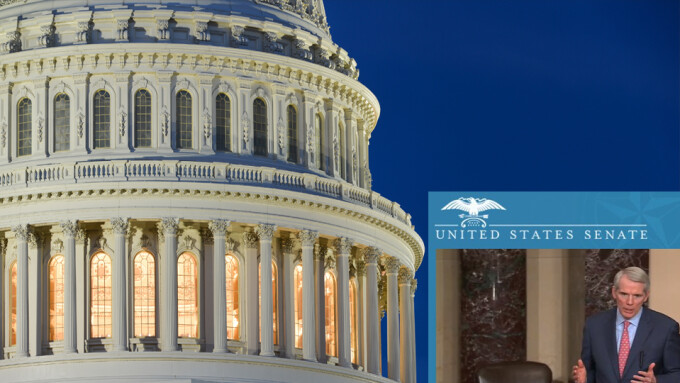WASHINGTON — The Senate today resumed consideration of legislation that would chip away at the internet's legal shield — Section 230 of the Communications Decency Act — with a bill that would make it easier to penalize operators of sites that facilitate online sex trafficking.
The Senate measure, known as SESTA (the Online Sex Trafficking Prevention Act), will vote on Wednesday, according to Ohio Sen. Rob Portman, who spoke on the Senate floor this evening.
SESTA comes on the coattails of FOSTA, a similar bill that passed in the House of Representatives by a 388-25 vote. The bill that was discussed today was essentially a combination of the two and is now known as SESTA-FOSTA (H.R. 1865).
Introduced by Portman, the bipartisan bill seeks to clarify sex-trafficking laws to make it illegal to knowingly assist, facilitate or support sex trafficking, and amend the Section 230 safe harbors of the Communications Decency Act — which makes online services immune from civil liability for the actions of their users — to exclude enforcement of federal or state sex trafficking laws from its immunity.
Portman spoke tonight on the Senate floor advocating for votes to affirm the piece of legislation. In pushing for votes, he said that “sex trafficking” amounts to a $150 billion vice industry, second only to the drug trade.
Portman, a Republican from Ohio, is chair of the Homeland Security and Governmental Affairs Permanent Subcommittee on Investigations.
He focused his comments primarily on the business model of Backpage.com, which was alleged to have “knowingly facilitate” with its customers to peddle underage individuals for sex, and said he welcomed the next few days debate over the issues of the bill.
But H.R. 1865, many contend, amounts to internet censorship and likely will do nothing to fight sex traffickers.
Since the companion bills were introduced, the Free Speech Coalition, the trade organization for the adult industries, called on its members to lobby their legislators against SESTA-FOSTA, stating the issues amount to the “free speech battle of the 21st century.”
The FSC said that the anti-trafficking bills threaten to decimate protections for sex workers and leaves adult producers open to massive liability.
SESTA-FOSTA is “dangerous for anyone with a sex-related business,” according to FSC Executive Director Eric Paul Leue.
“We are likely to see much greater restrictions placed on performer uploads on clips and cam sites, a new wave of banking closures, banned social media accounts, and wholesale abandonment of places online where workers can congregate,” Leue earlier said.
“While adult film production is legally distinct from sex work in California and New Hampshire, it is not elsewhere. SESTA-FOSTA means that state prosecutors would have full license to go after adult sites and performers in the rest of the country.”
The Electronic Frontier Foundation echoed the FSC and earlier cautioned that if a hole is punched through Section 230 of the Communications Decency Act through the passage of H.R. 1865, troubles could be compounded for online platforms because they could be held liable for their users’ speech.
“If websites can be sued or prosecuted because of user actions, it creates extreme incentives,” the EFF earlier said.
If H.R. 1865 passes on Wednesday, the bill goes to the president who can sign it into law within 10 days or veto it.
Pictured: Sen. Rob Portman







